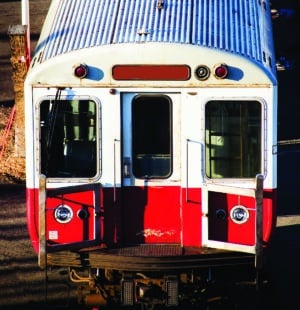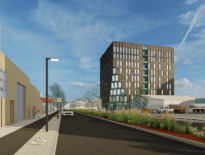The MBTA will seek private developers to demolish the Alewife station parking garage in West Cambridge and partner on a major transit-oriented project at the northern end of the Red Line.
The disposition will be the first to test a new strategy designed to maximize the income-producing potential of MBTA real estate through joint development agreements.
“We have a garage that is in very, very poor condition and the decision has been made that it should come down,” MBTA head of Transit-Oriented Development Scott Bosworth told the agency’s board in a presentation. “We’re looking to the private sector to partner with us to take that $175 million liability on our books and turn that into a cash positive through a joint development project.”
The MBTA will issue a request for proposals in the coming weeks and select a developer based upon qualifications, financial capacity and track record, according to meeting materials. The agency also is eyeing future transit-oriented developments at JFK-UMass station in Dorchester, Andrew station in South Boston and the Anderson Regional Transportation Center in Woburn.
The Alewife station property at 5 Cambridgepark Drive spans nearly 7 acres, including the 225,000-square-foot garage. The MBTA has spent over $22 million in recent years repairing the 34-year-old garage, after chunks of concrete broke loose in 2018 and a consultant discovered that some support beams were at risk of failure.
The garage redevelopment would follow a decade of rapid transformation in the neighborhood, including approximately 2,000 apartments built on Cambridgepark Drive and intense competition among commercial developers for acquisitions in the nearby Quadrangle neighborhood near the Belmont line.
Life science developer Healthpeak acquired 36 acres in the Quadrangle in 2021, prompting the Cambridge City Council to impose a moratorium on lab development to finalize long-delayed rezoning plans for the neighborhood. The council approved new zoning in 2023 that requires a housing component in large-scale developments.
Tougher Site Than Prior TOD
In recent years, the MBTA has struck deals with private developers on plans to build housing and other uses on parking lots next to stations. In Quincy, the MBTA partnered with multifamily developer Bozzuto and Hingham-based Atlantic Development on The Abby, a 610-unit apartment complex at the North Quincy station.
Another development site at the Green Line’s Riverside station in Newton has been delayed because of the downturn in life science space. Mark Development has approval to build 550 apartments and two office-lab buildings on the 13-acre site including surface parking.
The Alewife site would present a more complicated opportunity for developers, because of the need to minimize disruption with station operations and its 2,700-space parking capacity. The project would be the first test of an “innovative delivery” initiative designed to work more closely and efficiently with the private sector, requiring changes to existing state procurement laws, Bosworth said at the May 23 presentation.
The MBTA did not respond to a request for details on the legislative changes.
The joint development process would include pre-development agreements enabling project design, risk allocation and pricing to be developed in partnership between the MBTA and the developer, according to meeting presentation materials.
In recent years, Cambridge officials have discussed the potential for a new commuter rail station at Alewife, using air rights sold to private developers to offset the costs.
Healey Pushing State Properties for Housing
Gov. Maura Healey is looking to state-owned properties as a partial solution to Massachusetts’ housing affordability crisis. In October, Healey issued an executive order for state agencies to compile a list of underutilized properties suitable for housing generation.
Responding to questioning from board members, Bosworth acknowledged that housing may not be the highest-income-producing use of some locations.
“Here at Alewife, we know we have this facility that needs to be replaced. The thing here is we know we have large value. Our air rights are worth a lot of money here, so we can accomplish things,” he said. “But as we go into other spots in the system, we have to be realistic. Housing is not always the most lucrative development plan, but we have to have that conversation.”
Currently, the agency is partnering with private developers on 1,715 housing units in design or permitting at eight sites.
Active projects include a land swap with the Attleboro Redevelopment Authority for 600 housing units next to Attleboro station, a 120-unit project next to Salem station, a 40-unit affordable housing project next to Winchester Station, a financial contribution to a 94-unit affordable housing project near Roxbury Crossing station and an easement for WinnDevelopment’s 114-unit mixed-income project in Swampscott.
The MBTA will host a developer forum this month to seek comments on the language of the Alewife RFP, Bosworth said.









